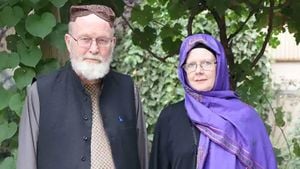Germany's finance minister, Joerg Kukies, affirmed on February 25, 2023, the staunch position of the Group of Seven (G7) nations against Russia's readmission to the group, emphasizing the clear condemnation of Russia's actions amid its third anniversary of the invasion of Ukraine. This statement was made shortly after U.S. President Donald Trump expressed his desire to see Russia rejoin the G7, calling its ousting during the G8 summit in 2014, following the annexation of Crimea, 'a mistake.'
On February 13, Trump voiced his opinion, saying, "I'd love to have them back. I think it was a mistake to throw them out." His remarks sparked immediate debate among political leaders, particularly because they coincide with the continued military and financial support the G7 has provided to Ukraine against Russian aggression since the escalation of conflict began.
Despite Trump's comments, Kukies made it clear, "The condemnation of the G7 of Russia's war of aggression is very clear." This remark marked the firm stance maintained by G7 members, even as tensions within the group have begun to surface.
The G7 nations, which include Canada, the United Kingdom, France, Germany, Italy, Japan, and the United States, have been united against Russia's actions, collectively labeling the invasion of Ukraine as unacceptable. This solidarity, which has seen them extend military aid to Ukraine, has been placed under strain due to Trump's administration’s recent foreign policy shifts. Just days before Kukies’ statements, the G7 was still negotiating a joint message to commemorate the anniversary of Russia's assault, highlighting differences among its members, particularly with the U.S.
Canadian Foreign Minister Melanie Joly remarked during the briefing on February 24, "We've been working, Indeed, with the Europeans and Americans. We are still having some conversations" on the status of the statement commemorative of the invasion anniversary. This indicates the discussions within the G7 are not only focused on military support but also on how to present their unified position publicly.
Adding to the complexity of the G7 discussions, Joly also highlighted the Canadian divergence from the U.S. position during recent UN votings, emphasizing her country’s discontent with U.S. proposals. Joly pointed out, "Canada and other countries don't agree with the position the U.S. advocated at the UN, particularly the resolution they brought up..."
The backdrop to these tensions includes the U.S.'s recent decision to abstain from condemning Russian actions at the United Nations, which also saw the U.S. voting alongside Russia and Belarus against resolutions criticizing Russia's actions. Such moves have not only placed the U.S at odds with allies within the G7 but have also raised concerns about the consistency of U.S. foreign policy priorities under Trump.
Historically, the G7 was the G8 until Russia's expulsion following its annexation of Crimea. Since then, the alliance has concentrated on showcasing unity against Russian expansionism and supporting Ukraine’s sovereignty. Yet, as Trump continues to advocate for Russia's inclusion back to the fold, internal debates among the G7 grow more intense, raising questions about the future geopolitical strategies of the bloc.
With world leaders both cautious and calculating, the outcome of these discussions will likely shape not only the future of NATO and global security frameworks but also the direction of Western foreign policies toward Russia and Ukraine. The broader implication of these tensions hints at cracks within Western alliances, with Trump's presidency potentially steering relations toward less unified stances.



